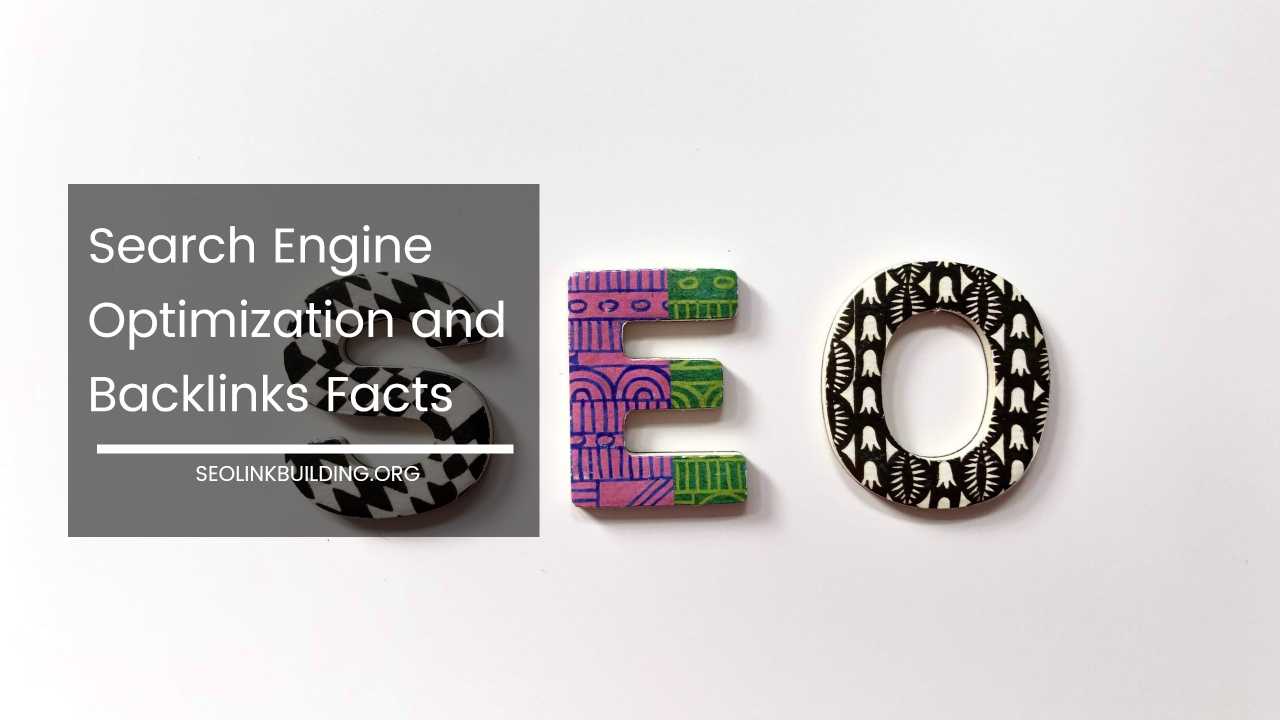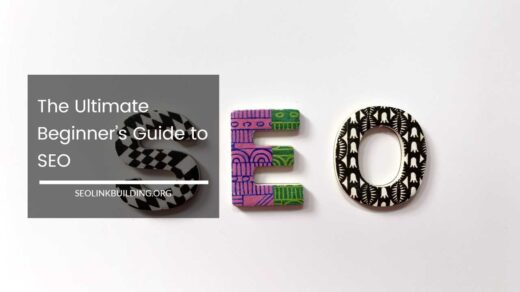Search Engine Optimization and Backlinks Facts

Search Engine Optimization and Backlinks Facts: Ranking Revelations
In the ever-evolving digital landscape, websites compete fiercely for user attention and search engine dominance. Search Engine Optimization (SEO) is the art and science of crafting a website to rank higher in search engine results pages (SERPs).
Backlinks, also known as inbound links, are a crucial element of any successful SEO strategy. This comprehensive guide delves into the fascinating world of SEO and backlinks, revealing essential facts to illuminate your path to ranking glory.
Demystifying Search Engine Algorithms: The Power Behind the Rankings
Imagine a vast library with countless bookshelves overflowing with information. Search engines like Google act as librarians, meticulously sifting through this information to deliver the most relevant results to user queries. But how exactly do search engines decide which websites deserve the top spots?
While the exact algorithms used by search engines remain a closely guarded secret, we do know that they rely on a complex interplay of hundreds of ranking factors. These factors can be broadly categorized into three main areas:
-
On-page Optimization: This involves optimizing elements within your website’s control, such as:
- Keyword Research and Integration: Identifying relevant keywords that users search for and strategically incorporating them into your website’s content, title tags, meta descriptions, and header tags.
- Content Quality and Relevance: Creating high-quality, informative, and engaging content that caters to your target audience’s needs and search intent.
- Website Structure and Navigation: Ensuring your website is well-organized, easy to navigate, and allows search engine bots to efficiently crawl and index your content.
- Internal Linking: Strategically linking your website’s pages to each other, creating a clear hierarchy and aiding search engines in understanding your website’s content structure.
- Mobile-friendliness: Optimizing your website for seamless viewing and functionality across various devices, especially mobile phones.
- Page Speed: Ensuring your website loads quickly to provide a positive user experience.
-
Technical SEO: This ensures your website’s technical aspects are sound, including:
- Website Security: Implementing HTTPS encryption to protect user data and demonstrate website security to search engines.
- Structured Data Markup: Providing search engines with additional information about your content using schema markup, which can enhance search result snippets.
- Robots.txt: A file that instructs search engine bots on which pages of your website to crawl and index.
- Sitemap: A file that lists all the important pages on your website and their relationships, making it easier for search engines to discover your content.
-
Off-page Optimization: This refers to efforts taken outside your website to build its authority and credibility. Backlinks are a cornerstone of off-page optimization, but it also encompasses other strategies like:
- Brand Mentions: Encouraging positive mentions of your brand name and website across the web, including social media platforms, online directories, and industry publications.
- Online Reputation Management: Actively managing your online reputation by responding to reviews, addressing negative feedback, and fostering positive brand sentiment.
- Social Media Engagement: Building a strong presence on relevant social media platforms and engaging with your audience to drive traffic back to your website.
The Backlink Ecosystem: A Deep Dive into Link Building Strategies
Think of backlinks as citations in the academic world. A website linking to yours is akin to a respected scholar referencing your work.
Search engines interpret backlinks as a sign of trust and authority. The more high-quality backlinks you possess, the more valuable and trustworthy your website appears in the eyes of search engines, potentially boosting your ranking.
Here’s a breakdown of why backlinks are so crucial for SEO, along with some additional considerations:
- Earning Trust and Authority: Backlinks from reputable websites act as strong endorsements, conveying to search engines that your content is valuable and trustworthy. This can significantly improve your website’s authority score, a metric used by some search engines to gauge website credibility.
- Improved Ranking Potential: Search engines often prioritize websites with strong backlink profiles, making them more likely to appear on the first page of SERPs, where the vast majority of user clicks occur.
- Increased Referral Traffic: Backlinks can drive targeted traffic to your website as users click through from the linking website. This can expose your brand and content to a wider audience, potentially generating leads and conversions.
- Link Diversity: It’s not just about the quantity of backlinks, but also the diversity. Having backlinks from a variety of websites with different domain names indicates a more natural link profile and can be viewed more favorably by search engines.
- Anchor Text Optimization: The text surrounding the backlink, known as anchor text, should be relevant to your content and ideally contain keywords related to your target audience’s search queries. However, avoid keyword stuffing within anchor text, as search engines may penalize such practices.
Building a Backlink Profile for the Long Haul: Sustainable Strategies
Earning high-quality backlinks takes time and effort. Here are some effective, long-term strategies to consider, moving beyond basic link building tactics:
-
Create High-Quality, Link-worthy Content: Exceptional content naturally attracts backlinks. Share valuable insights, conduct original research, or develop a unique perspective on your industry. This could include:
- In-depth Industry Reports: Compile valuable data and insights relevant to your niche, creating a resource that other websites would be compelled to reference.
- Compelling Case Studies: Showcase successful client projects or user stories that demonstrate the value proposition of your products or services.
- Visually Appealing Infographics: Create informative and visually engaging infographics that are easily shareable across social media and other platforms.
- Curated Content Collections: Compile valuable resources from across the web on a specific topic, providing a one-stop shop for users and potentially earning backlinks from the sources you include.
-
Guest Blogging with a Strategic Approach: Contribute informative guest posts to relevant websites within your niche, but go beyond simply placing a backlink in your author bio. Ensure your guest posts offer genuine value to the target audience of the host website. Research the website’s content themes and readership, and tailor your guest post to address their specific needs and interests.
-
Broken Link Building with a Focus on Quality: Identify broken links on websites in your niche that point to non-existent or outdated content. Reach out to the webmaster and suggest your high-quality content as a relevant replacement. However, prioritize suggesting replacements that genuinely offer value and avoid a purely self-serving approach.
-
Online Community Engagement and Thought Leadership: Actively participate in relevant online communities, forums, and social media groups. Share your expertise, answer user questions, and provide valuable insights. By establishing yourself as a thought leader in your industry, you can attract natural backlinks from others who recognize your authority.
-
HARO (Help a Reporter Out) Participation: HARO is a platform that connects journalists with sources for their stories. By signing up as a source on HARO and responding to relevant queries with your expertise, you can earn backlinks from high-authority news websites.
-
Building Relationships with Influencers: Identify key influencers in your niche and establish genuine connections with them. Collaborate on content creation, participate in joint webinars or podcasts, or sponsor industry events. By building relationships with influencers, you can leverage their audience reach and potentially earn backlinks from their websites or social media mentions.
The Ethical Backlink Landscape: Avoiding Penalties and Maintaining Trust
Black hat SEO tactics like buying backlinks or participating in link schemes can backfire. Search engines penalize websites that engage in manipulative practices. Here’s how to maintain a sustainable and ethical backlink profile:
- Focus on Quality over Quantity: Prioritize earning backlinks from high-authority, relevant websites over amassing a large number of low-quality backlinks.
- Disavow Low-Quality Backlinks: If you identify low-quality backlinks pointing to your website, use Google Search Console’s disavow tool to inform Google that you disavow any association with those links.
- Transparency and Authenticity: Always strive for transparency in your link-building efforts. Avoid cloaking techniques or other deceptive practices that aim to mislead search engines.
Beyond Backlinks: A Holistic SEO Approach for Sustainable Success
While backlinks are undeniably important, they are just one piece of the SEO puzzle. For optimal search engine visibility, ensure your website excels in all aspects of SEO, including:
- On-page Optimization: Continuously refine your on-page optimization strategies based on keyword research, user behavior analysis, and competitor insights.
- Technical SEO: Regularly monitor your website’s technical health using SEO audit tools and address any technical issues that could be hindering search engine crawling or indexing.
- Content Marketing: Develop a consistent content marketing strategy that caters to your target audience’s needs and interests. This not only helps with SEO but also establishes your brand as a thought leader in your industry.
- User Experience (UX): Prioritize user experience by ensuring your website is easy to navigate, visually appealing, and provides a positive user journey. User engagement metrics can also be a factor considered by some search engines.
The Takeaway: A Journey of Continuous Learning and Adaptation
SEO is an ongoing process that requires continuous monitoring, adaptation, and refinement. Here are some key practices to integrate into your SEO journey:
- Stay Updated on SEO Trends: The SEO landscape is constantly evolving. Regularly stay updated on the latest search engine algorithms, industry best practices, and emerging SEO trends. Utilize resources like official search engine webmaster guidelines, reputable SEO blogs, and industry conferences to stay ahead of the curve.
- Monitor Your SEO Performance: Track your website’s SEO performance using analytics tools like Google Search Console. Monitor your website’s ranking for relevant keywords, backlinks profile, organic traffic acquisition, and user engagement metrics. Use this data to identify areas for improvement and refine your SEO strategy accordingly.
- Embrace a Long-Term Perspective: Building a strong SEO foundation and earning high-quality backlinks takes time and effort. Avoid quick-fix solutions or black hat tactics, as they can ultimately harm your website’s search engine visibility. Focus on creating valuable content, building genuine relationships within your niche, and continuously improving your website’s overall user experience.
Conclusion: SEO and Backlinks – The Powerhouse for Ranking Success
By understanding the intricate relationship between SEO and backlinks, you can empower your website to climb the SERP ladder and achieve long-term search engine success.
Remember, SEO is a dynamic process that requires dedication and continuous learning. Embrace the journey, experiment with different strategies, and leverage the power of high-quality content and ethical backlink building to propel your website towards the top of search results.
This comprehensive guide has equipped you with the essential facts and strategies to navigate the world of SEO and backlinks.
Now it’s your turn to take action, implement these strategies, and witness the transformative power of SEO for your website!













